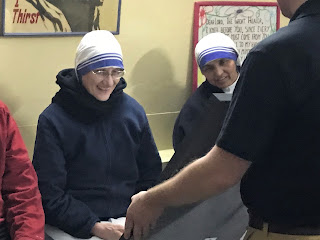A Volunteer's Day at the House for the Dying
This
mission trip I have had the opportunity to serve at Khalighat (the House for the Dying)
. Here I have had
the privilege to serve the poorest of the poor and those most forgotten. Here I
have been challenged to give more and more each day.
 |
| Chalk Board on the Stairs leading to the Chapel in the Mother House |
Each day
begins hopping on an overcrowded bus at roughly 8 am. Its about a 20 minute
ride to a nameless street, packed with life and color, sights and smells. It’s
a 10 minute walk dodging children, men women, cats, dogs, and rats. After
arriving we join the novice sisters for prayer, offering our work to the Lord,
asking Him to work through us. I have been touched how everything with the
Missionaries of Charity begins with prayer. They do nothing, no works and no
service without praying first. After prayer I go to my post. Armed with nothing
but an apron I begin to do laundry. I wash sheets and clothes for the poor for
over an hour at the beginning of everyday. This is one of my favorite jobs, it
is here that I build relationships with my fellow volunteers. From Boston,
Argentina, South Africa, China, and many other places, gathered around a stone
bath washing the clothes of Jesus. I am always so touched by the love I see in
the other volunteers, they inspire me to be a better man, and to love more.
After
doing laundry I start making my rounds visiting the men who are residents here.
This is where my brothers and myself experience our own poverty. We really can't
do anything. What I normally do is sit and listen to men talk in a lan
guage I cannot understand, and speak to them in a language they can't understand. I will hug the men, comfort them in anyway I can; they like back rubs. What they usually require is medical attention, primarily wound care. In this there is nothing I can do. The men come in off the streets maimed. Either missing toes or fingers, with broken bones, or other various gashes or puncture wounds. They are treated by the sisters and other trained volunteers. It is very touching to see these men cared for in such a charitable way, when many of them were left to die.
guage I cannot understand, and speak to them in a language they can't understand. I will hug the men, comfort them in anyway I can; they like back rubs. What they usually require is medical attention, primarily wound care. In this there is nothing I can do. The men come in off the streets maimed. Either missing toes or fingers, with broken bones, or other various gashes or puncture wounds. They are treated by the sisters and other trained volunteers. It is very touching to see these men cared for in such a charitable way, when many of them were left to die.
 The last
part of the day volunteering at Khalighat is serving the men lunch. We give
everyone the same Indian dish, all that I recognize is the rice. There is
normally enough for everyone to get seconds, and no one goes away hungry. Here
the men get a full meal that helps them regain their health and strength. When
lunch is over there is a huge assembly line to do all the dishes, and let me
tell you, there is a ton of them. The dishes, with about 8 or 9 people working, takes about 30-40 minutes to finish washing. The work day ends at
noon, where we then go to lunch and prepare for the afternoon schedule.
The last
part of the day volunteering at Khalighat is serving the men lunch. We give
everyone the same Indian dish, all that I recognize is the rice. There is
normally enough for everyone to get seconds, and no one goes away hungry. Here
the men get a full meal that helps them regain their health and strength. When
lunch is over there is a huge assembly line to do all the dishes, and let me
tell you, there is a ton of them. The dishes, with about 8 or 9 people working, takes about 30-40 minutes to finish washing. The work day ends at
noon, where we then go to lunch and prepare for the afternoon schedule.



Comments
Post a Comment